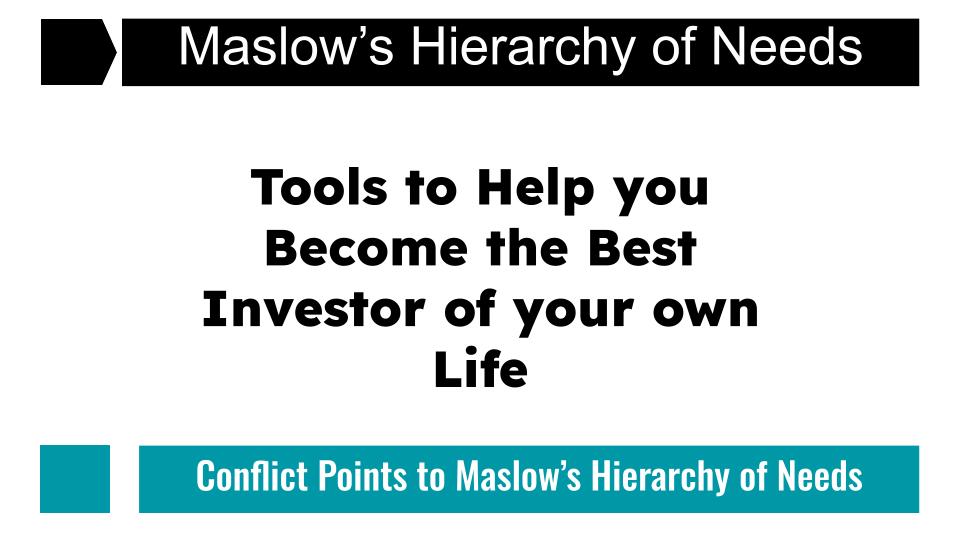“If you allocate a small amount to alcohol, cut the budget by half, you will be in a great financial position.” That’s easier said than done.
Firstly, we need to address the cause of overspending on luxury goods and services or unnecessary expenses by comparing Maslow’s hierarchy of needs, and the subsequent points of conflict that are invisible to most people.
There’s often a tendency to overconsume in a social environment due to exerted pressure by peers. Unfortunately, overspending on luxury goods or experiences before the basics are accounted for is easier. It is the first stage of the debt trap.
The lack of structure causes problems in spending, savings, and investment habits. And ultimately results in the following outcomes:
- Unaffordable debt.
- Falling behind on bills.
- Losing assets.
- Distractive behavior
- Increased stress levels

There is a connection between unaffordable debt and self-awareness.
Maslow’s hierarchy of needs can be equated to self-awareness. Unaffordable debt is caused by the self-awareness of trying to fit into a world through over-committing yourself so that you can reach the next desired level of financial freedom.
The disconnect is not abnormal, ironically, it comes from a lack of self-awareness. Sadness is often masked with things or expensive expressions to fill the void.
Overcoming the debt trap requires discipline.
Discipline is the most uncomfortable aspect of starting afresh in your life. Sometimes you must be seen as odd to change your life.
Failure to pay bills must be resolved in advance.
Tools that manage your finances before you begin spending are crucial for paying bills on time. The financial safety net is before an event, not after the expensive payment.
Once you have a house, and a job or business, you will always have expenses. Investing can contribute to a long-term plan to better prepare you for future endeavors, and unexpected circumstances.
Reserve money for other unexpected expenses. Utilizing money market accounts or interest-bearing accounts that allow 24-hour access to funds are great options.
Miscellaneous expenses like passport or license renewals come unexpectedly. It’s easier to fall behind when the fixed bills are not fully paid at any given moment. It’s a revolving cycle, especially if your income is fixed for a while.
Debt causes desperation: Results in a loss of fully paid-for assets to belong to clubs.
The debt trap causes people to lose their assets if they can’t afford to pay for their lifestyle.
People use stuff to build a false sense of belonging. Subsequently, people form clubs to build friendships, relationships, and connections. It might be a car brand club, a golf club with a huge annual fee, or a gambling club.
Your family and extended family members can also be seen as a club. Family values, respect, and belonging evolve based on financial status and contribution.
Social belonging is attributed to status. And this can also create conflict when it comes to knowing real love and intimacy.

Fully paid-for assets might be used as leverage to acquire more debt through cash loans or loan sharks.
Pawn shops are found around casinos for a reason. The two are interconnected. Drug dealers and criminals are willing to do anything to get their daily fix.
Our communities become places without empathy or love for others, but spaces where money rules the day. Instead of intimacy and solid relationships, there’s often isolation and disconnection.
Distraction starts when people are never satisfied.
Unreliability is the primary reason for disastrous financial outcomes. It is easier to count yourself out of opportunities if you’re unreliable. No employer wants to hire or work with an untrustworthy person.
A highly unfaithful person is worse than a moderately proficient reliable performer. Showing up is the key to success.
Joy comes when we can expand what we have now without fear of the unknown. The point of building financial independence only happens when one is no longer worried about the money in the bank. Creating value, building a family legacy in unity, and giving to charitable courses, are the main goals at this stage of financial independence.

Financial distress shows up in your body, mind, and, soul.
When stress accumulates, it is harder to perform at peak levels at your current job or creative pursuits.
When stress is too much, the quality of relationships suffers the most.
You are more susceptible to being sick when you are in financial turmoil.
The oversimplification of reaching self-actualization can also cause disinterest in everyday pursuits.
Instead of reaching self-actualization, some people often reach a phase where they are no longer thriving in life.

Financial values that are aligned with your goals are important. At this stage, the basics are no longer the only thing that you need to be concerned about.
You also have to see if you use money to align your values with God or against God.





Pingback: How do we avoid the death trap of unaffordable debt? - Upper Ground